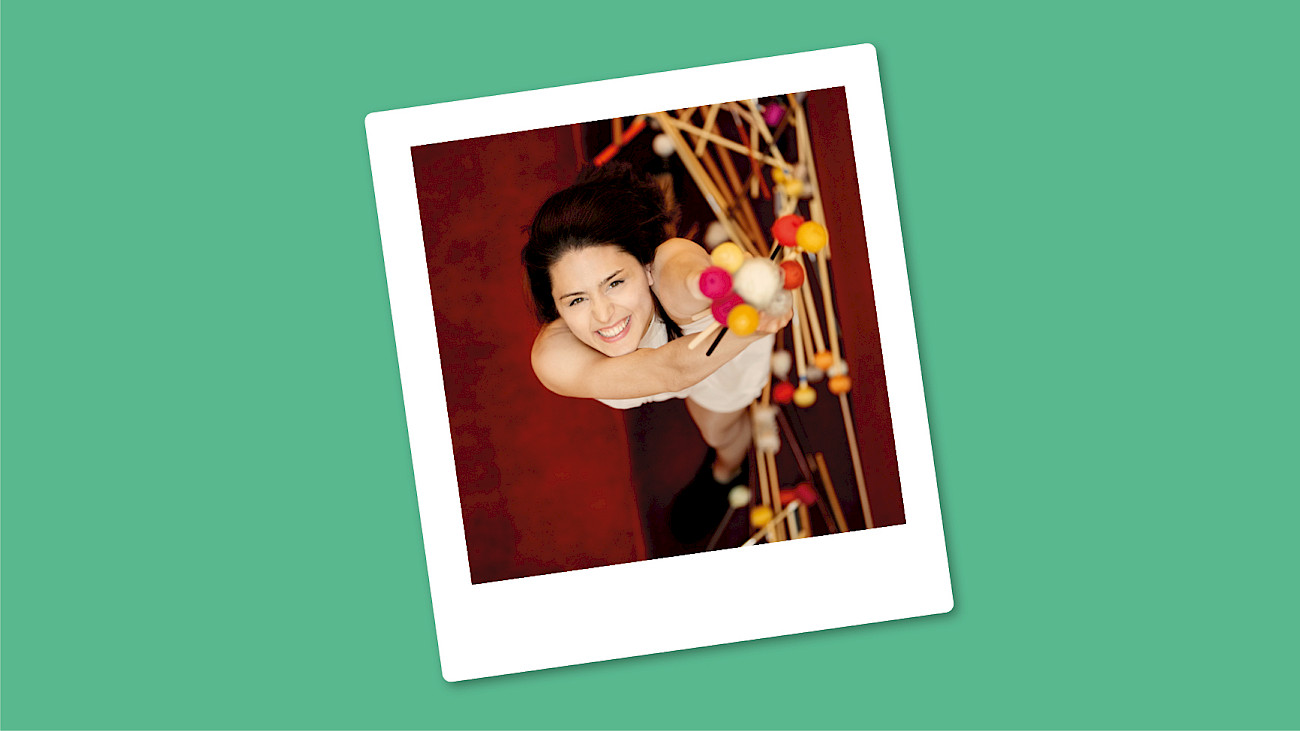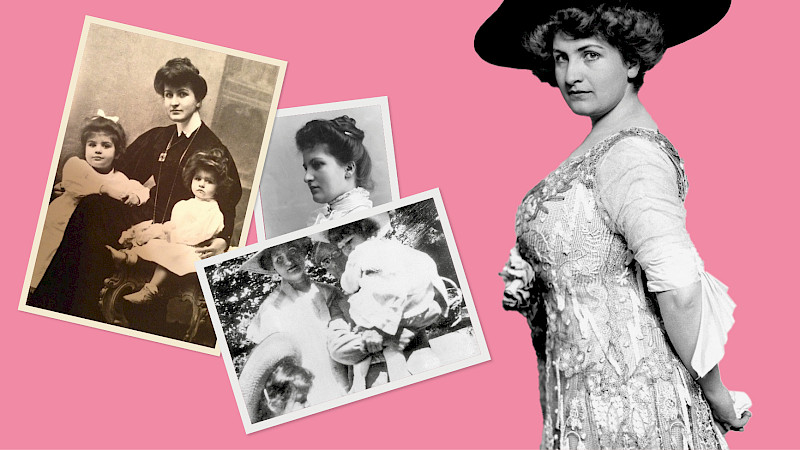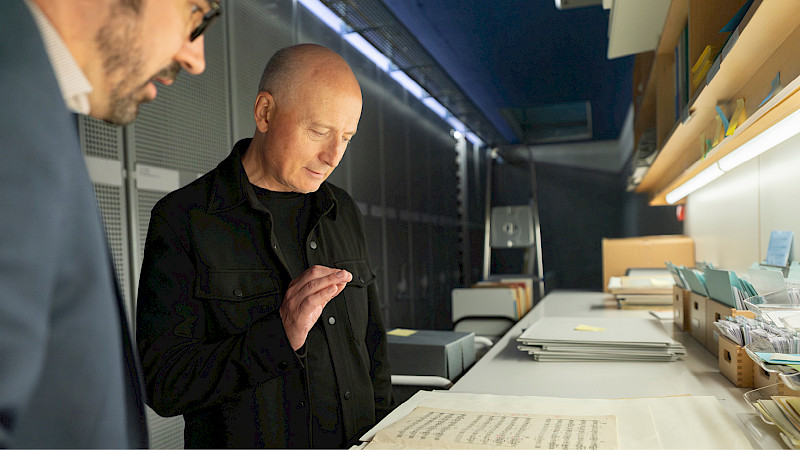
"Beethoven and Mozart just couldn't compose for us"
Vivi Vassileva is a drummer - and therefore also a competitive athlete. Sore muscles and hunger are her constant companions after rehearsals. Thanks to this physicality, she finds her inner centre.
I'm standing on a beach in Winterthur, which is littered with washed-up flotsam. But it doesn't look chaotic. The coffee capsules, flower pots, bottles, pans and many other objects seem to be organised according to an inner logic. "I probably know all the flower pots in the cities where I played this concert," says percussionist Vivi Vassileva, born in 1994, before her rehearsal in the soloists' room. She offers me a coffee and explains that my coffee capsule will be used later. Excuse me? I immediately start the coffee machine.
The next day, she will be performing Gregor A. Mayrhofer's "Recycling Concerto" with the Musikkollegium Winterthur on what is supposed to be a beach - the stage of the Stadthaus Winterthur. And she hopes that no "instruments" will be broken by then: "You can't retune a flower pot. You have to fight your way through four or five shops to find the perfect replacement."
It all starts on the beach
Her parents would certainly never have guessed that 30-year-old Vivi Vassileva would be making music out of flower pots. Her father and siblings are violinists and her mother is a pianist. At the age of eight, Vivi Vassileva was also on a beach on the Black Sea coast of Bulgaria, her home country. Here she watched a group of drummers letting off steam with Balkan rhythms. Her fascination was so great at that moment that she absolutely wanted to become a drummer.
When she became interested in percussion, her family sometimes made fun of her, she says with a laugh. They would say things like: "It's not your hands that have to hurt, it's your head." However, this is not one hundred per cent true for drummers. At the rehearsal in Winterthur, I notice that their work is like a full-body workout: endurance, strength, flexibility - nothing is left out. Her outfit fits in too: Tank top, ripped jeans and trainers. Sore muscles? Yes, absolutely, she says: "When I play on tubular bells, I feel all my muscles on every side - from my pecs to my triceps and biceps. After a session, I also have to eat three times more than usual."
Her parents' initial scepticism disappeared when the marimba arrived: "At that moment, their curiosity and spirit of discovery were also awakened." Her path to becoming a professional percussionist finally began at the age of ten with Claudio Estay. Vivi Vassileva can now look back on completing her studies with Martin Grubinger and numerous awards - including the Leonard Bernstein Award 2023 and two special prizes at the ARD Music Competition 2014.
"We are actually pioneers"
Drummers have long been a matter of course in rock bands, but not really as soloists in classical music. The drumset only emerged at the turn of the 19th and 20th centuries, mainly through jazz: "Beethoven and Mozart couldn't compose for us. That's one reason why we're sometimes not taken seriously." But the "legend of the century" Martin Grubinger was and is the pioneer of solo percussion in the world of classical music. His tonal and technical ideas and the school he established have given percussion a "head start of decades", says Vivi Vassileva.
"We are actually pioneers. We are helping to write history. That's so exciting." This also includes advising composers. A huge responsibility, "because these are the pieces that will hopefully survive the filter of our time and will still be written like this in a hundred years' time". It cannot be overlooked: Vivi Vassileva has big plans - and as there is still a lot to discover and develop in this world of solo percussion, she has found the ideal playground for herself here.
But there is still one fly in the ointment: "I think the greatest tragedy for us is that Stravinsky didn't live long enough to write a percussion concerto." She alludes to a specific work: "His 'Sacre du printemps' is still rhythmically Mount Everest." Percussionists dream of a concerto that is at this level in terms of music, rhythm and orchestration. With the stamina that Vivi Vassileva has to show in rehearsals, it is hard to believe that she can climb such a high mountain.
The breath of Athena
The vibrations of a timpani in the orchestra are not only felt by the percussionists, but also by all the other musicians: "We have this responsibility to keep the whole engine running." It's definitely about something important here: "We stand in a warrior stance so that we can feel this connection to the earth. You can't face a big taiko and face it with confidence if you're shaky. You need that stability. " Vivi Vassileva explains that all four elements play a role in drumming: Earth stands for rootedness to the ground, fire for passion in playing, water for flexibility (the mastery of many different percussion instruments) and air for the breath that she breathes into the notes with the beats - similar to what Athena did with people moulded from clay.
Musical circular economy
Back to the rehearsal in Winterthur and the "Recycling Concerto", which Mayrhofer wrote especially for Vivi Vassileva. During the pandemic, the two have tried out all kinds of things: Would it be possible to elicit a sound from a salt shaker or a plastic bag and would it work in the work as a whole?
One thing was certain: plastic definitely had to be represented. It makes rubbish a theme. But it doesn't stop there: the concert continues to process it into a musical circular economy. And the experimentation paid off: "The plastic bottle cadenza has become a great passage and a huge enrichment for our solo literature." It is this close exchange between musician and composer that makes percussion "more topical than ever".
Climate crisis or global waste problems - how much space should be given to such topics in art? Vivi Vassileva answers: "Art is the expression of urgent issues. We see climate change, rubbish, wars and the many challenges. Nobody knows how this will develop. If we are honest with ourselves as artists, it is clear that such issues are expressed as part of this honesty."
This honesty is now brought home to me: Vivi Vassileva throws coffee capsules onto the marimba in the first movement of "The Happy Tsunami of Wealth", and although I don't know which one was mine, it's here somewhere and is currently contributing to the flood of waste.
On 3 March 2025, the Kleine Tonhalle will not turn into a beach. A different kind of honesty will take to the stage here: in their programme "Face à Face", Vivi Vassileva and Frank Dupree break down the boundaries between percussion and piano - with works by Thierry Deleruyelle, Péter Eötvös and John Psathas. Incidentally, Frank Dupree has also undergone intensive percussion training. It is therefore not surprising that, according to Vivi Vassileva, the two are "absolutely on the same wavelength" in terms of energy.
We use deepL.com for our translations into English.





